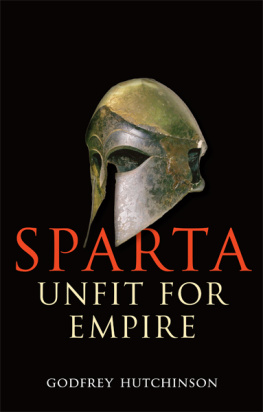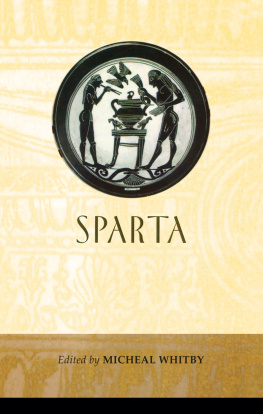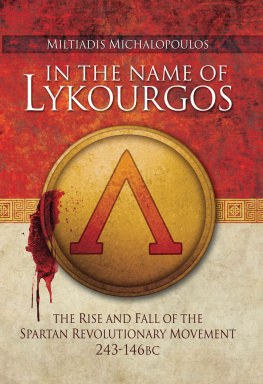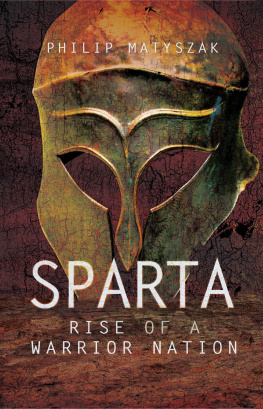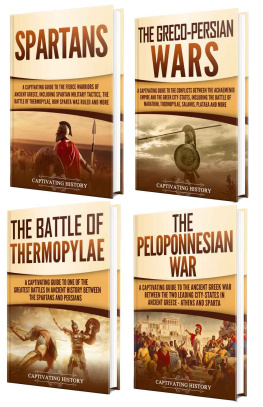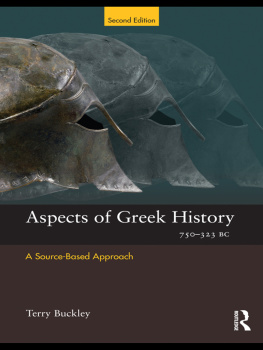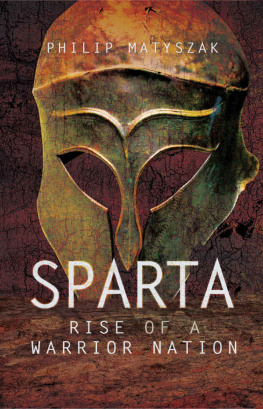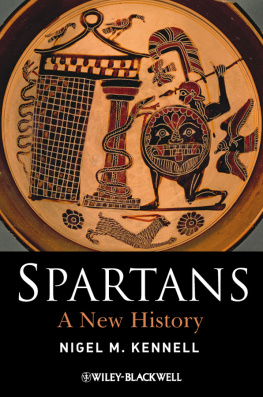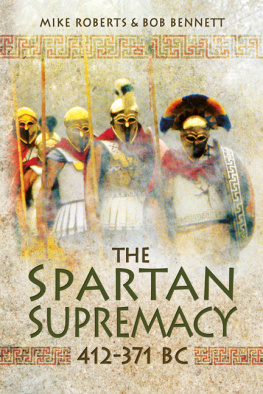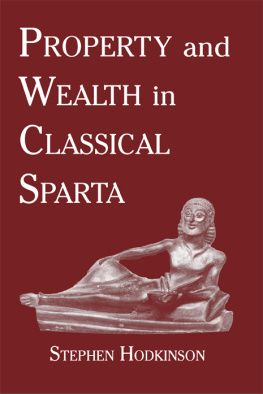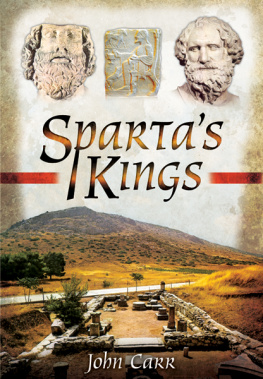To Oliver, Torquil and Mathilda

Sparta: Unfit for Empire
This edition published in 2014 by Frontline Books,
an imprint of Pen & Sword Books Ltd,
47 Church Street, Barnsley, S. Yorkshire, S70 2AS
Copyright Godfrey Hutchinson, 2014
The right of Godfrey Hutchinson to be identified as the author of this work has been asserted by him in accordance with the Copyright, Designs and Patents Act 1988.
ISBN: 978-1-84832-222-6
eISBN 9781473845893
All rights reserved. No part of this publication may be reproduced, stored in or introduced into a retrieval system, or transmitted, in any form, or by any means (electronic, mechanical, photocopying, recording or otherwise) without the prior written permission of the publisher. Any person who does any unauthorised act in relation to this publication may be liable to criminal prosecution and civil claims for damages.
CIP data records for this title are available from the British Library
For more information on our books, please visit
www.pen-and-sword.co.uk, email info@frontline-books.com
or write to us at the above address.
Contents
Illustrations
Plates
Maps
Battle Plans
Glossary
| agoge | the training and educational programme for Spartans |
| acropolis | the upper or higher city that served as a citadel |
| anastrophe | Spartan battlefield manoeuvre for folding back a phalanx wing |
| aspis | hoplite shield |
| boiotarch | an elective office within the Theban-led Boiotian confederacy. Office holders were expected to be generals in times of war |
| ekklesia | assembly |
| enomotia | a Spartan army unit of forty men |
| enomotarch | officer commanding an enomotia |
| ephor | senior Spartan magistrate, elected for one year |
| gerousia | the judicial and governing council of Sparta |
| harmost | Spartan governor of a colony |
| hegemon | position of leadership |
| helot | servile agricultural worker on a Spartan farm or estate holding a position in society between slave and freedman |
| hippeis | the chosen 300 serving as a Spartan kings bodyguard |
| homoioi | one of the names for a Spartan citizen |
| hoplite | heavy infantryman and a component of the phalanx |
| hypomeiones | inferiors, members of the class below full citizenship in Sparta |
| lambda | the insignia on a Spartan hoplites shield. The Greek letter L() |
| lochos | Spartan army unit of 640 men at full strength |
| lochagos | commander of a lochos |
| mora | Spartan army unit of 1,280 men at full strength |
| mothax | inferiors who were put through the agoge by wealthy friends |
| navarch | Spartan commander of the fleet and any associated land forces |
| neadamodeis | new citizens. Helot s freed in return for armed service |
| oligarchy | government by a minority group |
| peltasts | light-armed troops used initially as skirmishers but transformed by the reforms of Iphikrates |
| pentekostys | Spartan army unit of 160 men |
| perioikoi | free communities living in Lakonia and Messenia. |
| phalanx | the close formation in depth of interdependent hoplites |
| polemarch | commander of a mora . |
| rhetra | an adopted decision of the ekklesia (strictly speaking, a saying) |
| Spartiate | full Spartan citizen |
| syssition | Spartan military messes; there were several locations for the nightly meals, depending on the group the individual had joined |
| tagos | elected ruler of Thessaly |
| tresantes | cowards in the face of battle. These tremblers lost their citizen status |
Acknowledgements
S PECIAL THANKS MUST GO TO the anonymous reader. He was meticulous in his examination of my text and made several very useful suggestions. Originally the structure of the book was one in which an excursus was interposed between chapters, wherein cumulative aspects of the background to the period were given. Reluctantly, I was persuaded by him to gather these together in the form of Appendices to achieve a continuous narrative for what is now the first section of the book. Any errors or omissions remaining are my own.
I am indebted to the support and advice given to me over the years by Michael Leventhal, initially at his fathers publishing house, Greenhill, and now at Frontline. I have also appreciated the splendid transfer of information conducted initially by Stephen Chumbley and then by Kate Baker during the preparation of this publication. Thanks must also be given to Joanna Chisholm for the meticulous presentation of the text and to Shona Andrew for the excellent cover design.
I am greatly appreciative of the company of friends and family I enjoy when on field trips in Greece examining topography, battlefields and sites in preparation for my publications. All may not share my degree of enthusiasm but always show great humour and patience.
I have continued to profit from the generous and spontaneous support of Valerie Jones and Geoffrey Watson on a variety of technical matters.
A grant from the Royal Literary Fund gave me the opportunity to gather additional material for the revision of the original draft of this book.
Photographs, maps and battle plans were initially prepared by the author.
Introduction
Nothing short of a complete revolution in the Spartan state could have rendered her essay in empire a success; but the narrow Spartan system was too narrowly based in the narrow Spartan character to suffer such a revolution.
J. B. Bury, A History of Greece
T HIS IS A MILITARY HISTORY of the period between the end of the Peloponnesian War (404 BC ) and the Battle of Second Mantineia (362 BC ) and, as the title suggests, covers the successive hegemon ies of Sparta and Thebes. At the close of that war Sparta found itself in a position of ascendancy unprecedented in its history. The maritime Aegean empire of Athens was now added to the leadership Sparta enjoyed in mainland Greece.
One focus was the growing enmity between Sparta and Thebes, the leading city of the Boiotian Federation, and one of Spartas allies during the Peloponnesian War. That enmity led to Spartas inexorable slide from being the dominant land power in the Greek world for two centuries, to having the eventual status of a second-rate power at the hand of Thebes. All this happened in a matter of forty years, a time span almost coinciding with the reign of Agesilaos, one of the kings of Sparta.
The text gives the reader the broad sweep of the ever-changing alliances that occurred throughout the period, but its main concern lies with military operations. What, until relatively recent times, has traditionally been viewed as a formalised method of Classical hoplite warfare is often belied by close examination of sources. The opinion that battles were fought between two armies on plains, usually after provocation by the invading force or by mutual agreement, is more romantic than actual. The tradition stems from observations made well after the Classical period even by greatly respected historians such as Polybios (XIII. 3. 26) living some 200 years after the beginning of the period under discussion. Pitched battle was not the regular currency of Greek warfare and, when it did occur, was sometimes the result of accident, surprise or expediency. It was easy for a strong city-state to bully one that was weaker. To destroy crops or capture livestock may have been a gross annoyance and economically damaging. However, it did not always result in the men of the attacked area coming out from behind their walls for a formal contest of arms, much as that might have been the desire of the invaders. Such meetings on plains were more often between larger coalitions and are certainly the pattern for the period under review. Much of what has come to be regarded as the rules of play will be seen, in , to emanate more from shared religious observance notably followed more meticulously by Spartans than by others.

